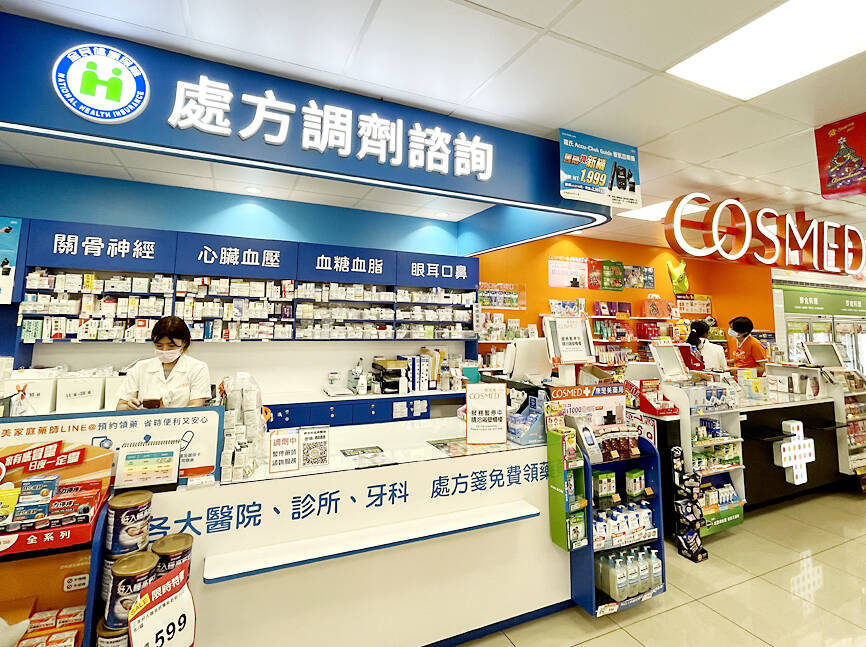Yunlin and Nantou, Taiwan’s two “super-aged” counties, have the highest density of pharmacies in the nation.
There are more than 7 million people in Taiwan with refillable prescriptions for chronic illnesses, meaning that about one out of four people need to take drugs on a regular basis.
New Taipei City has the most pharmacies in the nation, but Yunlin and Nantou counties have the highest density of pharmacies, the latest Ministry of Health and Welfare (MOHW) and Ministry of the Interior (MOI) statistics show.

Photo: Yang Ya-min, Taipei Times
The two counties have become super-aged societies — meaning that people aged 65 years or older account for more than 20 percent of the population — ahead of other cities and counties.
The MOHW’s data showed that there are 8,665 pharmacies nationwide with a license and a pharmacist or an assistant pharmacist managing their business.
Most of the nation’s pharmacies are in the six special municipalities, with 1,396 in New Taipei City, 1,155 in Taichung, 978 in Kaohsiung, 866 in Taipei, 840 in Taoyuan and 757 in Tainan.
There is an average of one pharmacy per 2,685 people nationwide, and the highest pharmacy density is in Yunlin County, with one pharmacy per 2,102 people, followed by Nantou County, with one pharmacy per 2,252 people.
The percentage of people aged 65 or older in Yunlin and Nantou counties is 20.12 percent and 20.13 percent respectively, meaning that these counties have become super-aged earlier than the National Development Council (NDC) had predicted.
The NDC predicted that Taiwan would become a super-aged society in 2025.
On the other hand, despite the percentage of people aged 65 or older in Taipei having already exceeded 20 percent, the pharmacy density in the city is one pharmacy per 2,865 people, which is lower than the average density nationwide.
In terms of dependent population — people aged 14 years or younger, and 65 years or older — the highest pharmacy densities are in Yunlin County (one pharmacy per 645 dependent people), Nantou County (one pharmacy per 685 dependent people) and Chiayi City (one pharmacy per 688 dependent people).
Taipei has the second-lowest pharmacy density for dependent people, with an average of one pharmacy per 959 dependent people, and an official said that the reason could be because Taipei has the highest amount of large hospitals in the nation, and it might therefore need less pharmacies.
Meanwhile, Cosmed and Watsons, the nation’s two largest cosmetics chain store operators that also sell non-prescription drugs, have been expanding their branches and opening pharmacies selling prescription drugs.
Shirley Kao (高秀玲), head of Uni-President’s beauty business, which runs the group’s department stores and Cosmed, last year announced that the chain would open at least 100 pharmacies, and the goal was achieved in June this year.
Watsons is planning to open its first pharmacy in the first half of next year.
Many prescription drugs can be filled at Cosmed’s pharmacies, and the company has also launched an app, allowing consumers to book an appointment to refill a prescription by uploading a photo of their prescription.
In the post-COVID-19 pandemic era, consumers have higher health consciousness, which have increased demand, Watsons Taiwan CEO Alice Huang (黃艾知) said.

The inspection equipment and data transmission system for new robotic dogs that Taipei is planning to use for sidewalk patrols were developed by a Taiwanese company, the city’s New Construction Office said today, dismissing concerns that the China-made robots could pose a security risk. The city is bringing in smart robotic dogs to help with sidewalk inspections, Taipei Deputy Mayor Lee Ssu-chuan (李四川) said on Facebook. Equipped with a panoramic surveillance system, the robots would be able to automatically flag problems and easily navigate narrow sidewalks, making inspections faster and more accurate, Lee said. By collecting more accurate data, they would help Taipei

STATS: Taiwan’s average life expectancy of 80.77 years was lower than that of Japan, Singapore and South Korea, but higher than in China, Malaysia and Indonesia Taiwan’s average life expectancy last year increased to 80.77 years, but was still not back to its pre-COVID-19 pandemic peak of 81.32 years in 2020, the Ministry of the Interior said yesterday. The average life expectancy last year increased the 0.54 years from 2023, the ministry said in a statement. For men and women, the average life expectancy last year was 77.42 years and 84.30 years respectively, up 0.48 years and 0.56 years from the previous year. Taiwan’s average life expectancy peaked at 81.32 years in 2020, as the nation was relatively unaffected by the pandemic that year. The metric

TAKING STOCK: The USMC is rebuilding a once-abandoned airfield in Palau to support large-scale ground operations as China’s missile range grows, Naval News reported The US Marine Corps (USMC) is considering new sites for stockpiling equipment in the West Pacific to harden military supply chains and enhance mobility across the Indo-Pacific region, US-based Naval News reported on Saturday. The proposed sites in Palau — one of Taiwan’s diplomatic allies — and Australia would enable a “rapid standup of stored equipment within a year” of the program’s approval, the report said, citing documents published by the USMC last month. In Palau, the service is rebuilding a formerly abandoned World War II-era airfield and establishing ancillary structures to support large-scale ground operations “as China’s missile range and magazine

A 72-year-old man in Kaohsiung was sentenced to 40 days in jail after he was found having sex with a 67-year-old woman under a slide in a public park on Sunday afternoon. At 3pm on Sunday, a mother surnamed Liang (梁) was with her child at a neighborhood park when they found the man, surnamed Tsai (蔡), and woman, surnamed Huang (黃), underneath the slide. Liang took her child away from the scene, took photographs of the two and called the police, who arrived and arrested the couple. During questioning, Tsai told police that he had met Huang that day and offered to